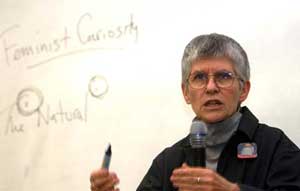
The interview began with this light greeting from 64-year-old American scholar of feminism Cynthia Enloe, who has gained world renown as an unparalleled expert on militarization and women's issues and is currently a professor at Clark University (Worcester, Massachusetts).
Visiting Seoul on February 23 at the invitation of the Asian Center for Women's Studies (director Kim Eun-shil) of Ehwa Women's University, Professor Enloe majored in Political Science at UC Berkeley, and personally established the Women's Studies Program at Clark University in 1972. Noting the influence that the mammoth system of international politics, militarism and the munitions industry has on women's everyday lives, she began researching militarization and gender politics. She also authored books on militarism and women's issues, such as Does Khaki Become You?, Bananas, Beaches and Bases, and Maneuvers: The International Politics of Militarizing Women's Lives. Enloe shares a long and deep relationship with Korean women. She was tutor to Kwon In-sook (professor of Florida State University), who became famous for exposing the sexual torture she faced in Bucheon Police Station during her student activist years. Another one of Enloe's students is Professor Katharine Moon (Wellesley University), author of Sex Among Allies: Military Prostitution in U.S.-Korea Relations.
Enloe gave an open lecture on February 24 at Ehwa Women's University entitled "Making Feminist Sense of State Security: Women, Masculinity and Militarism," before which she held a press conference.
- Your reasons for visiting Korea?
"I wanted to meet Korean feminists to analyze the worldwide acceleration of the war threat and to talk about Korea's particular situation. I'd also like a chance to search for feminist alternatives and actions."
- You majored in Political Science. What made you turn to Women's Studies later on?
"When I was studying Political Science at UC Berkeley in the 1960s, I wasn't interested in Women's Studies. Furthermore, I had never dwelled on feminist politics or the recovery of women's rights. It was while talking to feminist activists and taking part in their activities that I developed a feminist awareness. And in 1974, it was the students at Clark University who took issue with the absence of a Women's Studies Program and pressured the professors, including myself, to create one. The Women's Studies program is not my idea; I started teaching Women's Studies and Women's Politics at the request of my students, to whom I am grateful."
- What are your thoughts on the Bush administration's war on Iraq, and what actions should feminists take?
"When the American president makes announcements about the Iraq war, he must be responsible for not just his words but their results. The American president is currently quite 'masculinized.' Military control is only part of the authority held by the president, but right now it seems to be the only presidential duty.
American feminists are researching whether the Bush administration's militarized politics is just an outcome of 9.11 or a manifestation of some other reason found in America's political culture. Despite having failed to gain wide popular support during his presidential election campaign, Bush was able to push ahead with hard-line policies with little resistance because America's political culture has adopted the view that presidential authority is masculine. Another reason is that feminist leanings and intervention in American interests characterizing UN's stance for the past 15 years may have incurred the resistance of the US right wing. Feminist scholars must do in-depth research on such deep-rooted political consciousness."
- What is the role of Korean feminist activists in view of national reunification?.
"First and foremost in the minds of women when it comes to reunification should not be whether or not reunification should take place or how it should be achieved, but studying how women's lives will be affected by reunification."
While meeting Korean feminist scholars after the press conference, Enloe asked for help in gathering a variety of resources, saying, "I'm interested in the sexual division of labor, and would like to research the lives of women workers in the past sneakers industry in Busan." Enloe also suggested that another area that merits research is the activities of Korean male factory owners who shrewdly make use of the women workers' femininity to their profit.

